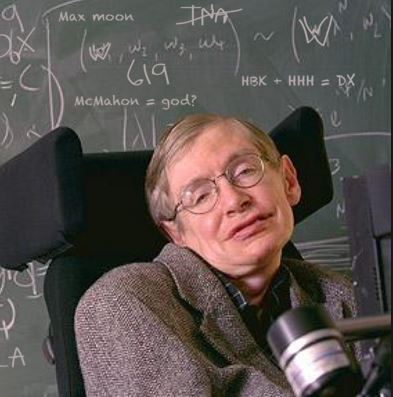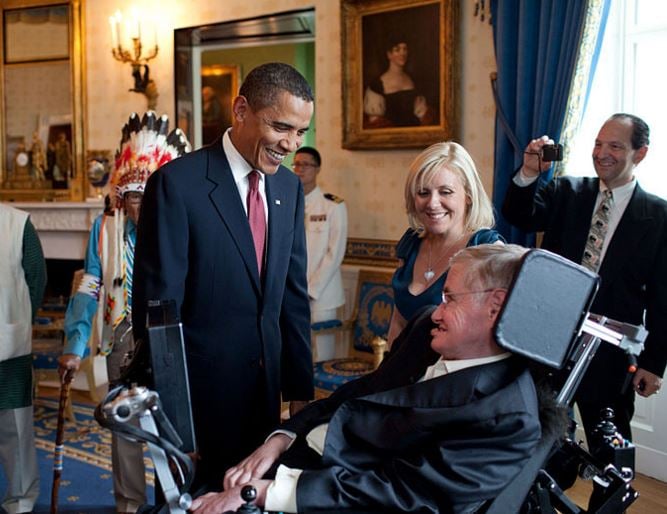Humans are at risk of extinction because of several dangers of our own making, including a nuclear war or accident, climate change, genetically-engineered viruses, or artificial intelligence, says Professor Stephen Hawking, the world-famous theoretical physicist, cosmologist, author and Director of Research at Cambridge University’s Centre for Theoretical Cosmology.
As we make further breakthroughs in science and technology, the number of ways things can go wrong will increase, he said. Prof. Hawking is giving 2016’s BBC Reith Lectures.
The Reith Lectures are a series of radio lectures that are given once a year by leading figures of the day. They are commissioned by the BBC and broadcast on Radio 4 and BBC World Service.
 Scientific and technological breakthroughs are great and exciting, but they also increase the risk of leading to our own destruction, Prof. Hawking warns. (Image: hawking.org.uk)
Scientific and technological breakthroughs are great and exciting, but they also increase the risk of leading to our own destruction, Prof. Hawking warns. (Image: hawking.org.uk)
In the Reith Lectures, which will be broadcast on 26th January and 2nd February, Prof. Hawking will explore recent research into black holes. His warning was in response to a questions by the audience.
We’ll definitely survive when we colonise other planets
As long as we manage to establish colonies in other planets before a catastrophe of our own making occurs, the human race will be able to survive.
BBC News quotes Prof. Hawking as saying:
“Although the chance of a disaster to planet Earth in a given year may be quite low, it adds up over time, and becomes a near certainty in the next thousand or ten thousand years. By that time we should have spread out into space, and to other stars, so a disaster on Earth would not mean the end of the human race.”
“However, we will not establish self-sustaining colonies in space for at least the next hundred years, so we have to be very careful in this period.”
Many people find it ironic that such a scientific genius and prominent figure sees scientific and technological progress as a potential threat to human survival.
 Stephen Hawking studied physics at Oxford University and graduated with a first-class BA (Hons.) degree in 1962. (Image: universetoday.com)
Stephen Hawking studied physics at Oxford University and graduated with a first-class BA (Hons.) degree in 1962. (Image: universetoday.com)
Prof. Hawking warns about AI future
Last year, Prof. Hawking said:
“The development of full artificial intelligence could spell the end of the human race.”
He says he fears that artificial intelligence (AI) might one day take off on its own – re-designing itself at a faster and faster rate. “Humans, who are limited by slow biological evolution, couldn’t compete, and would be superseded,” he added.
In December, three prominent science and technology figures were nominated for the Luddite of the Year Award – Prof. Hawking, Microsoft founder Bill Gates, and rocket and electric car maker Elon Musk.
However, Prof. Hawking emphasized that we will find ways to cope. “We are not going to stop making progress, or reverse it, so we have to recognise the dangers and control them. I’m an optimist, and I believe we can,” he said.
 Hawking talks with President Barack Obama in the Blue Room of the White House before a ceremony presenting him, along with 15 others, with the Presidential Medal of Freedom on 12 August 2009. (Image: Wikipedia)
Hawking talks with President Barack Obama in the Blue Room of the White House before a ceremony presenting him, along with 15 others, with the Presidential Medal of Freedom on 12 August 2009. (Image: Wikipedia)
When he was asked what advice he would give to young scientists, Prof. Hawking said every researcher should retain a sense of wonder about our ‘vast and complex’ Universe.
The public must be informed
Prof. Hawking added:
“From my own perspective, it has been a glorious time to be alive and doing research in theoretical physics. There is nothing like the Eureka moment of discovering something that no one knew before.”
He also believes that future generations of scientists need to be aware of how scientific and technological progress are rapidly changing our world, and to help lay people understand it.
He made the following comment on scientific progress in democratic societies:
“It’s important to ensure that these changes are heading in the right directions. In a democratic society, this means that everyone needs to have a basic understanding of science to make informed decisions about the future.”
“So communicate plainly what you are trying to do in science, and who knows, you might even end up understanding it yourself.”
 Stephen Hawking was born in Oxford, England, on 8th January, 1942. He got his degree at The University of Oxford and his Phd at the University of Cambridge. He is best known for Hawking Radiation, Penrose – Hawking Theorems, and ‘A Brief History of Time’. (Image: YouTube)
Stephen Hawking was born in Oxford, England, on 8th January, 1942. He got his degree at The University of Oxford and his Phd at the University of Cambridge. He is best known for Hawking Radiation, Penrose – Hawking Theorems, and ‘A Brief History of Time’. (Image: YouTube)
Hawking says ‘Don’t tell aliens we are here’
Prof. Hawking is also worried about the dangers associated with blasting messages into deep space in the hope of telling faraway intelligent aliens we are here, especially if we invite them to come and visit.
He reminds us what happened to the American Indian after Christopher Columbus set foot on the New World. “It didn’t turn out very well for the Native Americans,” he said.
For any extraterrestrial civilization to be able to understand our message, and then have the capability of visiting us, they would have to be hundreds or perhaps thousands of years technologically more advanced that we are. They would probably be considerably more intelligent than us.
Would an ultra-advanced civilisation be nice to us, or do us harm? If we look at our own behaviour with other life forms on Earth, it is doubtful. We eat other creaters, exterminate them if they get in our way (pesticides), hunt them, catch them and parade them in zoos, have them as pets, and experiment on them. Many species are now extinct because of us.
Hawking closer to winning Nobel Prize
Prof. Hawking is said to be closer to being awarded the Nobel Prize for Physics, as evidence emerges that may prove his work into radiation from black holes.
Prof. Hawking’s theory that black holes emit radiation (dubbed ‘Hawking Radiation’) – which would mean that small black holes would evaporate – needs to be proven before he is awarded the big prize.
According to The Times, Prof. Hawking said evidence supporting his theory was emerging.
While talking about his theory and the evidence he is trying to obtain, during a lecture Prof. Hawking displayed a picture of the prizewinner’s medal.
According to hawking.org.uk: “Professor Hawking has twelve honorary degrees. He was awarded the CBE in 1982, and was made a Companion of Honour in 1989. He is the recipient of many awards, medals and prizes, is a Fellow of The Royal Society and a Member of the US National Academy of Sciences.”
Video – Stephen Hawking on Earth’s chances of sustaining life
Prof. Hawking at his first Australian public lecture, appears at the Sydney Opera House from Cambridge University in England via hologram technology.
